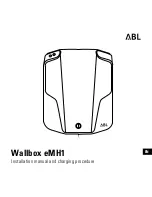
WARNING
Wet brakes or brakes coated with ice or road salt react slower and need longer stopping
distances.
x
Carefully apply the brakes to test them.
x
Always dry brakes and clean off ice and salt coatings with a few cautious brake
applications when visibility, weather, road and traffic conditions permit.
WARNING
Driving when the brake booster is not working increases stopping distances and can cause
accidents and serious personal injuries.
x
Never let the vehicle coast when the engine is switched off.
x
If the brake booster is not working (such as when the vehicle is being towed), a lot more
pedal force is needed to slow down and stop.
NOTICE
x
Never “ride” the brakes by keeping your foot on the brake pedal when you do not want to
brake. Constant pressure on the brake pedal can make the brakes overheat. Riding the brakes
will substantially reduce braking performance, increase stopping distance, and can cause
complete brake system failure.
x
Before driving downhill, especially on hills that are long or steep, always reduce speed and
shift into lower gear (manual or automatic transmission). This will let the vehicle use engine
braking and reduce the load on the brakes. Otherwise, the brake system could overheat and
possibly fail. Only use the brakes when you need them to slow the vehicle down more or to
stop.
When the front brakes are serviced, you should have the rear brake pads inspected at the same
time. The wear of all brake pads should be visually checked regularly. The best way to check for brake
pad wear is to have your authorized Volkswagen dealer or authorized Volkswagen Service Facility
visually inspect the pads through the openings in the wheel rims or from underneath the vehicle. If
necessary, the wheels can be taken off for a more thorough inspection.
Braking assistance systems
¤
Please first read and note the introductory information and heed the WARNINGS
The ESC, ABS, BAS, ASR, and EDL braking assistance systems work only when the engine is
running. These systems can significantly improve active driving safety.
Electronic Stability Control (ESC)
ESC helps to improve road holding and vehicle dynamics to help reduce the probability of skidding
and loss of vehicle control. It works only when the engine is running. ESC detects certain difficult
driving situations, including when the vehicle is beginning to spin (yaw) out of control. ESC then helps
you to get the vehicle back under control by selectively braking the wheels and/or reducing engine
power and by providing steering assistance to help hold the vehicle on the driver's intended course.
ESC has limitations. It is important to remember that ESC cannot overcome the laws of physics. It will
not always be able to help out under all conditions you may come up against. For example, ESC may
not always be able to help you master situations where there is a sudden change in the coefficient of
friction of the road surface. When there is a section of dry road that is suddenly covered with water,
















































